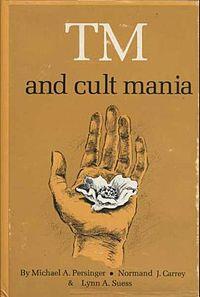What is a cult?
A cult is a group or movement with deviant and novel beliefs and practices, regarded by others as strange. It exhibits excessive devotion to some person or ideas.
The group usually uses manipulation to persuade and to control the members, including isolating cult members from former friends and family, managing information, forcing members to suspend their individuality or critical judgment, and promoting total dependency on the group and fear of leaving it.
Cults can be harmful to their followers because of a potent and dangerous combination of total authority of the leaders, submission by the followers, and “the ends justify the means” mind-set.
Teens are intellectually and spiritually open to new ideas. Unfortunately, they have not achieved the balance of experience and maturity that would enable to gain sufficient sophistication to evaluate complex philosophies critically.
This naive idealism and intellectual curiosity attracts youth to join a group that professes to offer a vision of a perfect society.
 |
www.toplessrobot .com
Characteristics of cults:
-
Members submit to an authoritarian all-powerful leader or leaders whose decisions cannot be questioned. Rational thought is discouraged.
-
Leaders force followers to break off and cut off from their families and friends and from information from media.
-
Cult members are told the outside world is evil and the cult and its members are good.
-
Every life decision may be made by the cult leaders, including whether members should go to school, keep their jobs, marry or bear children.
-
Cults control their members’ time.
-
Followers raise money for the group.
-
Members, especially women and children, may be psychologically, physically or sexually abused.
-
Cult leaders claim the outside world is against them. Cults often have contempt for outside society and its laws because they believe they are above human standard and work for the good of the world.
What Can Parents Do?
Parents can do many things to help prevent their children from joining a cult.
-
Keep the lines of communication with your children open. Stay in touch with what’s happening in their lives during their difficult transition period to becoming independent adults.
-
Give your children a sense of belonging. Alienation from family relationships precedes cult membership. Youths are compensating for unfulfilled needs such as love, sense of belonging.
-
Build up your child’s self esteem. Cult recruiters prey on youngsters’ insecurities.
-
Help your children deal with the complexities of life. Cult often offers instant answers and instant happiness. Youngsters must learn that life is not simple, and they must learn to cope with change and stress.
-
Help your children to find meaning in their lives and spiritual fulfillment. Many youngsters search for meaning and spiritual fulfillment. They may turn to cults to get this need.
-
Help your youngsters find group activities and companionship. Cults offer children a community and sense of belonging. Encourage them to join constructive group activities.
-
Don’t pressure them too much to be successful. Help them to deal with the normal stress of living in our complicated world. Children are often overwhelmed by parents’ and schools’ demands, and cults offer an easy way out.
-
Assure and tell your children frequently that you love them. Parents often assume their children know they love them, but that’s not always the case. Youngsters often feel lonely, and cults offer love and companionship.
-
Assert your authority as a parent. Many children turn to cults because they provide guidance, structure and authority that make them feel secure.
-
Encourage critical thinking so they can rationally assess cults’ claims.
-
Look for warning signs of cult involvement, such as a decline in academic achievement or study habits, a sudden change in personality or behaviour, alienation, changes in physical appearance or health, withdrawal from home or social activities, unusual style of dress, an increase in secretiveness, and changes in friends and social interactions.
-
Seek help if you feel it is necessary.
 |
en.wikipedia.org
References:
-
Marcia R. Rudin. What parents need to know about cults. PTA Today, November 1989.
-
Eagan Hunter, Professor of Education, St. Edward’s University, Austin, Texas; Adolescent Attraction to Cult. The Free Online Library.
| Last Reviewed | : | 26 May 2014 |
| Writer | : | Dr. Norharlina binti Bahar |
| Accreditor | : | Dr. Nik Rubiah binti Nik Abdul Rashid |







